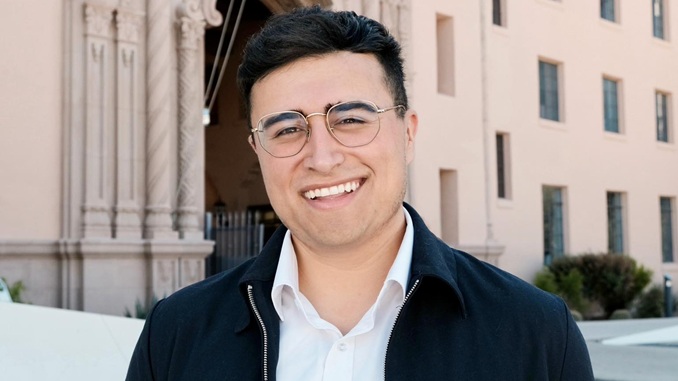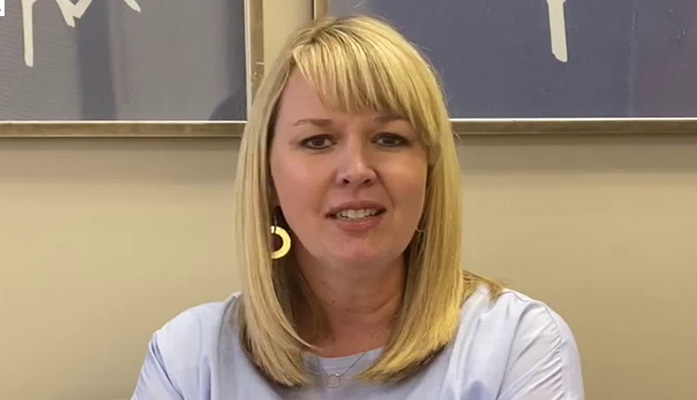
by Staff Reporter | Oct 30, 2025 | News
By Staff Reporter |
Newly obtained evidence reveals the pornographic and violent past of a Democratic leader in Tucson.
The posts, advocating for the harming and murdering of his political opponents and promotion of his pornography, came from Rocque Anthony Perez: an appointed Tucson City Council member (Ward 5) and, until joining the council in recent months, an executive director for Congresswoman-elect Adelita Grijalva’s Metropolitan Education Commission (MEC) nonprofit.
MEC advises and makes recommendations on K-12 education for Tucson as well as all of Pima County.
The California Globe published copies of since-deleted social media posts they received as a reflection of Perez’s recent past as a creator and disseminator of pornography, and an advocate of political violence.
In addition to the trove obtained by the Globe, AZ Free News recovered archived posts by Perez detailing his consistent advocacy for the harming and murdering of his political opponents.
The incriminating posts recovered occurred under two accounts: “@rocqueperez” and “@localanthony.” From the former, Perez posted his controversial political posts, and from the latter, Perez posted his pornographic posts.
From 2019 to 2020, Perez had served as Student Body Senator at the University of Arizona. He also led Tucson’s Pride Festival in 2019.
Throughout 2020, Perez advocated for the assault and murder of his political opponents.
In a June 2020 post, Perez told a friend to murder his conservative family members after the friend complained that living with them was unbearable.
“So kill them, do your duty baby girl,” said Perez.
In July 2020, Perez retweeted a picture of Ivanka Trump posing with a can of Goya beans with the following caption:
“Someone throw this b***h off the capitol building roof please,” said Perez.
Perez asked for someone to assault conservative activist and pundit Kaitlin Bennett in a January 2020 post.
“How has she not gotten beat yet? Like… hath no one the bravery to literally hurt her cause…?” said Perez.
“Roses are red, violets are blue, vote for Joe Biden, or I’ll cut you,” posted Perez in one post, with a picture of him pointing scissors at the camera.
“This vapid white girl is defending Trump[’s] response to COVID in my Zoom public relations class, do I end her or do I end her,” said Perez.
Perez expressed his hope, multiple times, that President Donald Trump would contract COVID-19 and die.
“PLEASE give Trump the Coronavirus please lordt, he is an at risk PLEASE,” posted Perez in March 2020.
In October, when then-President Donald Trump announced that he and then-First Lady Melania Trump tested positive for COVID-19, Perez advocated for the president’s death.
“Take his life baby! Get him!” said Perez.
“Honestly I would take one for the team and knock him out if I could,” said Perez in a repost of a July post from Trump.
In an August 2020 post, Perez made a post about how he and the purportedly haunted Annabelle doll (who, at the time, was the subject of a viral rumor of having escaped the museum housing it) should kill the president.
“Annabelle escaped and I’m like, hey bb girl we got some people you should meet, don’t be shy, go say hell [knife emoji],” said Perez.
In July 2020, Perez expressed hope that COVID-19 would infect and eliminate multiple elderly Republican voters and members of the Arizona Republican Party leadership, including then-chair Kelli Ward, then-Sen. Martha McSally, and Rep. Paul Gosar.
“A lot of old white people in one place, it’d be a shame if [COVID] got em,” said Perez.
In March 2021, Perez asked in a post on X whether he should fight then-Governor Doug Ducey.
“Just saw Doug Ducey, do I square up or do I square up,” posted Perez.
Under his @localanthony handle, Perez posted pornographic videos and pictures to promote his Only Fans account.
Despite his numerous posts advocating for harm and death to his political opponents and his publicized OnlyFans content, Perez maintained his post as the public relations lead, then marketing and communications strategist for the University of Arizona, his alma mater. He would maintain that latter job through 2022 before joining Arizona State University as their communications manager.
ASU hired him, though Perez posted “F**k Arizona State University Bro” on his page in early January 2020.
Perez’s term on the Tucson City Council ends in December.
AZ Free News is your #1 source for Arizona news and politics. You can send us news tips using this link.

by Matthew Holloway | Oct 30, 2025 | Education, News
By Matthew Holloway |
The Phoenix Union High School District (PXU) is preparing for significant budget reductions and potential staff layoffs as enrollment continues to drop, according to a letter sent to district employees on October 24th by Superintendent Thea Andrade.
In a letter to PXU colleagues posted to X by Phoenix Union Governing Board Member Jeremiah Cota, Andrade cites a decline of approximately 1,800 students in the 2025-2026 school year, following a drop of about 1,200 students the previous year. This represents a total loss of roughly 3,000 students, or about 10% of the district’s overall population, since its high point in 2022.
The superintendent attributes the budget cuts to “a significant decline in student enrollment.” In her letter, she explains that “the reasons for declining enrollment are complex,” and pivots to what she says are contributing factors: “the largest expansion of Empowerment Scholarship Accounts (ESA) in our state’s history,” the continued growth of charter schools, local demographic challenges such as gentrification and low birth rates, and the expiration of several federal Elementary and Secondary School Emergency Relief (ESSER) funds.
The announcement drew immediate response from Governing Board Member Jeremiah Cota, who slammed the district for casting blame on ESA families, charter schools, and Arizona’s Republican-led legislature.
In his post, Cota said that as a board member, he has repeatedly requested improvements in school safety and has been “all but ignored.” He also expressed concern that parents are hesitant to send children to district schools due to safety issues and “woke identity politics” in classrooms.
Cota wrote in full:
“Today, Phoenix Union High School District announced an untold number of possible job cuts due to declining enrollment.
It’s unfortunate, this district has chosen to blame ESA families, charter schools, and the GOP legislature for their budget shortfalls.
As a board member for @PhoenixUnion, from day one I’ve asked to make our schools safer and have all but been ignored on EVERY single request.
Parents, don’t feel safe sending their kids to one of our schools and are tired of the woke identity politics being injected in the classroom.
Yet, here we are, big enrollment drops and possibly even bigger job cuts coming.
TRUTHFULLY, I am concerned the present board will not take any corrective action to stem this decline.”
To address the financial strain, the district has already implemented cuts. In the 2023-2024 school year, it reduced district office budgets by $8.6 million and reorganized the executive team, eliminating several administrative positions to shield campus roles. For the 2024-2025 school year, per AZ Family, an additional $5.8 million was cut through district office reductions, unfilled vacancies, and natural attrition.
As previously reported by AZ Free News, the Phoenix Union High School District (PXU) faced major controversy going into a vote to approve a Memorandum of Understanding (MOU) with Chicanos Por La Causa (CPLC) to provide substance abuse prevention and mental health services at three high schools. The MOU outlines CPLC’s role as a subgrantee of the Arizona Health Care Cost Containment System (AHCCCS) under the federal Substance Abuse Prevention and Treatment Block Grant (SABG).
The MOU would also permit CPLC to offer “Health Masculinity Services for Self-Identified Males.”
Looking ahead, the district projects it will need to cut another $15 million in the 2025-2026 school year and $20 million in the 2026-2027 school year to maintain solvency. Approximately 90% of the district’s annual budget goes toward employee salaries and benefits, Andrade noted.
Matthew Holloway is a senior reporter for AZ Free News. Follow him on X for his latest stories, or email tips to Matthew@azfreenews.com.

by Jonathan Eberle | Oct 30, 2025 | News
By Jonathan Eberle |
Arizona State Senator David Farnsworth (R-LD10), chairman of both the Senate Appropriations and Transportation committees, is pushing to bring private-sector innovation to Arizona’s public transportation system.
In a recent meeting with Uber policy officials, Farnsworth called for new partnerships that harness technology and market-based solutions to make transit in the East Valley more efficient, cost-effective, and responsive to residents’ needs.
The meeting focused on exploring how companies like Uber could play a larger role in shaping Arizona’s transportation future — particularly through autonomous vehicle technology. Farnsworth highlighted the success of similar programs by Waymo and urged Uber to consider developing comparable systems that could supplement or even replace traditional fixed-route bus services.
“We have a responsibility to find effective solutions for the people of Arizona, rather than simply maintaining inefficient systems that waste taxpayer funds,” Farnsworth said. “Meeting with companies like Uber highlights a significant opportunity to let innovation take the lead.”
Farnsworth emphasized that current bus routes often operate with minimal ridership, resulting in high operational costs with limited public benefit. By contrast, autonomous ride-share models could provide flexible, on-demand transit available around the clock — reducing taxpayer burden while improving reliability and safety.
The senator framed his proposal as part of a broader effort to prioritize fiscal responsibility and smart governance. “Autonomous vehicles can provide safer and more efficient transportation, and I will keep working to ensure that Arizona remains at the forefront of realistic and sustainable travel options for the future,” he added.
Farnsworth’s initiative reflects a growing movement among Arizona lawmakers to integrate private-sector innovation into state infrastructure systems. As the East Valley continues to grow, policymakers are looking toward new ways to connect residents to jobs, schools, and local businesses — without expanding costly and underused public transit routes.
If discussions progress, Farnsworth’s collaboration with Uber could mark a turning point for Arizona’s approach to public transportation, signaling a shift toward efficiency, adaptability, and technology-driven mobility.
Jonathan Eberle is a reporter for AZ Free News. You can send him news tips using this link.

by Matthew Holloway | Oct 29, 2025 | News
By Matthew Holloway |
Recent filings show Mesa City Councilwoman Julie Spilsbury raising $94,207 for her November 4 recall defense, including several Democratic donors and aligned figures.
Spilsbury, a two-term council member, entered the reporting period with a remaining balance of $1,631 from January filings before piling on over $90k in donations. Her total raised now exceeds her 2023 re-election campaign by nearly $30,000. She has reportedly spent $32,866 during the period, including $28,700 on consultant services.
Among Spilsbury’s donors are Tim Stringham, a Tempe Navy veteran and unsuccessful Democratic candidate for Maricopa County Recorder; Jennifer Pawlik, former Chandler Democratic state representative; and other individuals with Democratic ties.
Stringham contributed an unspecified amount, Pawlik gave $100, and former Maricopa County Recorder Stephen Richer gave $1,000, as reported by The Mesa Tribune.
Spilsbury also received $1,500 from the John Giles for Mayor Committee. Giles served as Mesa mayor for a decade before leaving office in January 2024 and has vocally supported both former President Joe Biden and former Vice President Kamala Harris in their presidential campaigns.
In addition to the others named, Councilwoman Spilsbury’s donor list includes: Colleen Wheeler, a Mesa healthcare executive ($4,250); Yasser Sanchez, a Gilbert immigration attorney ($3,500); David Johnson, a Mesa real estate broker ($2,500); David Stahle, a Mesa financial consultant ($2,500); Mary “Marcie” Hutchinson, Mesa Public Schools Governing Board member ($1,000); Stan Barnes, Mesa Republican political consultant ($500); Sean Lake, Mesa land-use attorney ($500); Dennis Kavanaugh, former Mesa councilman ($100); Dr. Andi Fourlis, former Mesa Public Schools superintendent ($100); Lacy Chaffee, Mesa Public Schools Governing Board member ($100); and Richard Humpherys, husband of Gilbert Public Schools Governing Board member Jill Humpherys ($50).
The councilwoman also received $17,300 from political action committees, including $6,750 from United Mesa Firefighters, $6,750 from Moms Fed Up, and $2,500 from Country First.
Taylor, a political newcomer, reported expenditures of $5,717, including $4,072 to Mesa Sign Shop and $900 to Moir & Associates for consulting.
Taylor’s donors include: Earl Taylor, a Mesa retiree and founder of Heritage Academy charter school ($3,200); Scott Grainger, a Mesa forensic engineer ($2,000); David Winstanley, a Mesa retiree ($1,042); David Cummard, a Mesa insurance CEO ($1,000); Joseph Hughes, a Gilbert retiree ($1,000); and Melody Whetstone, who ran against Spilsbury in the 2023 primary ($105).
Taylor received $5,500 from PACs, including $5,000 from the Arizona Free Enterprise Club’s Freedom Club and $500 from the Home Builders Association of Central Arizona.
The recall petition, initiated by a resident with assistance from Turning Point USA, gathered 5,235 signatures, of which Maricopa County verified 3,858. The petition accuses Spilsbury of using her office to advance private interests, citing her votes in favor of a temporary homeless shelter in District 2, a council pay raise, and increases in residential and commercial utility rates. The shelter vote passed 4-3; the pay raise and utility rate increases passed unanimously 7-0.
Spilsbury’s support for an anti-discrimination ordinance extending protections to groups, including gender identity, has also been referenced in the recall effort. Taylor has connected Spilsbury’s shelter vote to homelessness issues in Mesa.
In December 2023, residents at a council meeting criticized Spilsbury and former Mayor John Giles for supporting Vice President Kamala Harris and other Democratic candidates in the presidential election. The Republican committees of Legislative Districts 9 and 10 passed resolutions censuring Spilsbury for campaigning on behalf of multiple Democrats.
In the July 2023 primary for District 2, Spilsbury received 8,120 votes, or 65.91%, out of 12,322 total votes cast. District 2 has 49,329 registered voters, according to the Mesa City Clerk.
Spilsbury and her supporters have canvassed neighborhoods every Saturday since early September. Taylor has conducted door-to-door outreach and met with voters in the district.
The city estimates the special election will cost at least $104,577. The winner will take office the day after the vote count. If Spilsbury retains her seat, she will serve through January 2029; if Taylor wins, she will complete the remainder of the term.
Matthew Holloway is a senior reporter for AZ Free News. Follow him on X for his latest stories, or email tips to Matthew@azfreenews.com.

by Staff Reporter | Oct 29, 2025 | Education, News
By Staff Reporter |
Northern Arizona University (NAU) is the latest in the state to drop its program with a Chinese university over national security concerns.
House committees on the Chinese Community Party and Education and the Workforce released a report last month flagging security concerns within NAU’s partnership with a Chinese municipal public university, Chongqing University of Post and Telecommunications (CQUPT).
The report outlined the main pathways by which China manipulates the American university system to benefit its military interests.
“What once came through Confucius Institutes now flows through new channels — less visible but no less strategic,” stated the report. “The Select Committee is now actively investigating these additional CCP activities — including the China Scholarship Counsel and student visa pathways — which, combined with joint institutes, illustrate a coordinated strategy by the CCP: leverage American institutions to train PRC talent, absorb U.S. research, and convert that knowledge into military and economic advantage. Joint institutes are just one vector — the problem is systemic.”
Rep. Eli Crane commended NAU for shutting down the program following the report’s publication.
“I applaud Northern Arizona University’s leadership in reviewing its international partnerships and ensuring that its programs align with national security initiatives,” said Crane in a press release on Monday. “NAU’s actions reflect a responsible approach to protecting students, faculty, and the integrity of U.S. research and education. We greatly appreciate their commitment to these shared values, as well as all they do for Northern Arizona.”
The CQUPT program was a 3+1 dual-degree program in Electrical Engineering.
Full withdrawal will occur within 90 days, per Crane’s press release.
NAU’s program was one of over 50 university partnerships the congressional committees deemed “high-risk” for their involvement with universities guided by Chinese Communist Party (CCP) military and defense interests. The congressional committees disclose that the list is not all-inclusive and that more may exist.
The University of Arizona (U of A) had two programs included in the congressional report that were deemed high risk: one with the Harbin Institute of Technology (HIT) and the other with the Arizona College of Technology (ACT) at Hebei University of Technology (HUT).
The HIT program is one of three joint programs that American universities launched with one of China’s Seven Sons of National Defense (SSND) universities.
Only universities selected by the Chinese Communist Party (CCP) to advance China’s military and defense research qualify as SSND.
Although the report declared the HIT partnership to be active, U of A has stated it terminated its partnership in December 2023.
The committees also determined the University of Arizona’s Arizona College of Technology at Hebei University of Technology.
Last month, U of A faculty were advised that Chinese microcampuses would be closed following congressional advice on national security concerns with the partnerships.
U of A issued a notice on its Research and Partnerships page last December that SSND posed “atypical security risks and concerns about misuse of research for military purposes” due to their being controlled by CCP’s Ministry of Industry and Information Technology.
AZ Free News is your #1 source for Arizona news and politics. You can send us news tips using this link.

by Staff Reporter | Oct 29, 2025 | News
By Staff Reporter |
The Phoenix Police Department (PPD) is considering multiple policy revisions on reduced uses of force.
In all, PPD will act on five policies impacting the usage of spit socks, handheld irritants (oleoresin capsicum and Mark-9 canister sprays, which are pepper sprays, and the MK-3 Repuls Spray, a chemical spray), Tasers, impact weapons (expandable batons), and less lethal launchers (PepperBall launchers, 40mm Launcher, 37mm Launcher).
PPD says its goals in modifying these reduced use of force policies are to ensure trained officers deploy these tools, and that officers modify their use of these tools when faced with certain medical aid considerations.
Spit socks won’t be applied to individuals actively vomiting, exhibiting signs of medical distress, or having had direct or indirect contact with pepper spray. Officers may only apply one spit sock at a time to an individual, and only when two or more officers are present.
The updated policy on handheld irritants also prohibits officers from using pepper spray within three feet, and recommends against deploying chemical spray directly into the eyes. It also requires the immediate handcuffing of the individual sprayed.
Police Assistants (PAs) may carry pepper spray, since they lack authorization to arrest or restrain individuals. PAs aren’t sworn police officers; they handle calls for service not requiring the presence of sworn police officers.
As for the updated policy on Tasers, officers may not use them on females known to be pregnant or visibly pregnant, the elderly, juveniles, handcuffed arrestees, and very thin individuals.
The policy would also set limits on ranges of deployment, and the preferred targets.
Similarly, PPD set forth targeting and distance guidelines for less lethal launchers. The various launchers also come with their own restrictions on which officers may use them based on training.
Impact weapons (batons) would be carried at officer discretion and carrying officers must be trained.
The deadline for public input and comments is Friday, Oct. 31.
Earlier this year, PPD implemented a new use of force policy which contained similar, controversial adjectives — “necessary” and “proportional” — as these proposed policies.
Law enforcement experts questioned the vagueness and ambiguity of the descriptors in policy meant to empower officers to action. The word “reasonable” was traditionally relied upon, which critics say was more than enough.
These developments are the latest progression of PPD’s “less-than-lethal” program, which rolled out in 2021 across two precincts. The initial tools used were the 40mm launcher and pepper ball systems.
By 2022, PPD rolled out the program to all city precincts, launched new deescalation training modules, and revised its use of force policy to include the additives of “necessary” and “proportional” to “reasonable,” as well as the duties to intervene and provide medical assistance.
Additionally, PPD launched a pilot program for use of force investigations and evaluations.
In 2023, PPD expanded the less-than-lethal program to include 400 new tools and additional training.
Even with these efforts to revert to alternative weapons and deterrents for use of force, some fatalities have occurred. In January, PPD shot hard plastic projectiles at a wanted felon, Turrell Clay, who was evading police on a roof and had been armed. Clay came down off the roof after being shot by the less-than-lethal projectiles several times; he later died at the hospital during surgery after complaining of chest pains.
AZ Free News is your #1 source for Arizona news and politics. You can send us news tips using this link.






